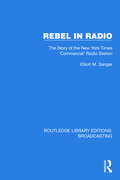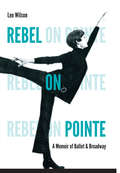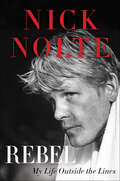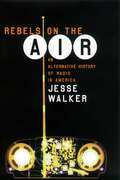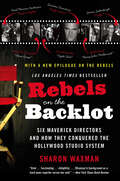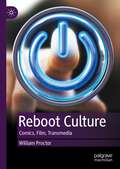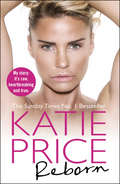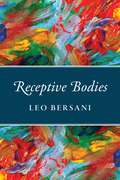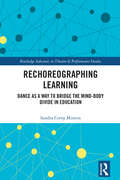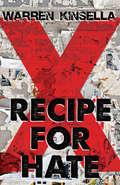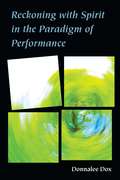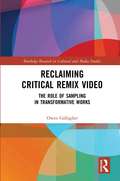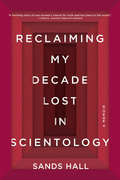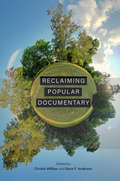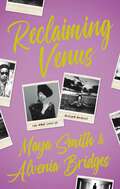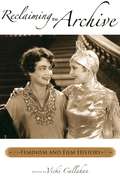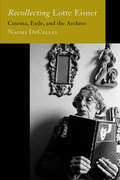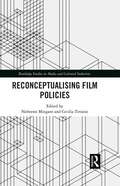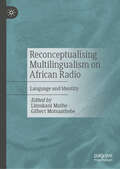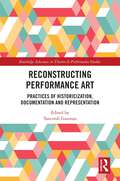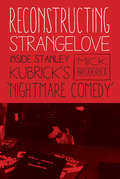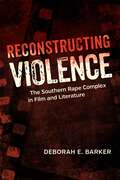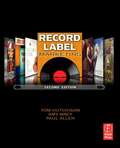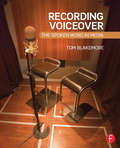- Table View
- List View
Rebel in Radio: The Story of the New York Times 'Commercial' Radio Station (Routledge Library Editions: Broadcasting #30)
by Elliott M. SangerRebel in Radio (1973) looks at the story of WQXR, the rebel New York commercial radio station. It examines WQXR’s place in broadcasting history, and how, at a time when American commercial radio had become but a pawn of the advertising industry, it showed that a radio station could be competitive and still maintain high programme and advertising standards.
Rebel on Pointe: A Memoir of Ballet and Broadway
by Lee WilsonShort, plump, pigeon-toed, and never good enough for mom, Lee Wilson dared to dream she could grow up to be a star. In this uplifting memoir, Wilson describes how she grand jetéd from the stifling suburbia of the 1950s, a world of rigid gender roles, to the only domain where women and men were equally paid and equally respected—in grand, historic dance theaters and under the bright lights of the Broadway stage.At the age of sixteen, Wilson made her classical ballet debut in Monte Carlo. Eight months later, she thrilled to the sound of her first bravos—and she never looked back. After touring Europe and dancing with the Metropolitan Opera Ballet in New York, she set her sights on Broadway, where she danced in many Broadway shows, including Hello Dolly! and the record-breaking performance of A Chorus Line.Rebel on Pointe immerses the reader in a remarkable and visionary world. It lifts the veil of myth surrounding legendary dance icons like George Balanchine to reveal the real men and women who have made American dance and dancers an international phenomenon.Wilson expertly depicts how her profession—at times considered so rigid and exacting—was a leading force in the liberation of women from the prison of post-war society. The hard-won gains and the maddening setbacks of the gender revolution are seen here through the eyes of a young dancer searching for freedom one “pas” at a time.
Rebel: My Life Outside the Lines
by Nick NolteThe legendary icon tells his story—a tale of art, passion, commitment, addiction, as intense and hypnotic as the man himself.In a career spanning five decades, Nick Nolte has endured the rites of Hollywood celebrity. Rising from obscurity to leading roles and Oscar nominations, he has been both celebrated and vilified in the media; survived marriages, divorces, and a string of romances; was named the “Sexiest Man Alive” by People magazine; and suffered public humiliation over his drug and alcohol issues, including a drug-fueled trip down a “long road of nothingness” that ended in arrest.Despite these ups and downs, Nolte has remained true to the craft he loves, portraying a diverse range of characters with his trademark physicality and indelible gravelly voice. Already 35 when his performance in the 1976 miniseries Rich Man, Poor Man launched him to stardom, Nolte never learned to play by Hollywood’s rules. A rebel who defies expectations, an obsessive method actor who will go to extremes for a role (he lived among the homeless to prepare for Down and Out in Beverly Hills), Nolte is motivated more by edgier, more personal projects than by box office success. Today he is clean yet still driven, juggling a number of upcoming works and raising his young daughter.A man who refuses to hide his mistakes, Nolte now delivers his most revealing performance yet. His revealing memoir, filled with sixteen pages of color photos, offers a candid, unvarnished close-up look at the man, the career, the loves, and the life.
Rebels on the Air: An Alternative History of Radio in America
by Jesse WalkerExplores the alternative radio that refuses to succumb to the big business that monopolizes the airwavesBoring DJs who never shut up, and who don't even pick their own records. The same hits, over and over. A constant stream of annoying commercials. How did radio get so dull? Not by accident, contends journalist and historian Jesse Walker. For decades, government and big business have colluded to monopolize the airwaves, stamping out competition, reducing variety, and silencing dissident voices. And yet, in the face of such pressure, an alternative radio tradition has tenaciously survived. Rebels on the Air explores these overlooked chapters in American radio, revealing the legal barriers established broadcasters have erected to ensure their dominance. Using lively anecdotes drawn from firsthand interviews, Walker chronicles the story of the unsung heroes of American radio who, despite those barriers, carved out spaces for themselves in the spectrum, sometimes legally and sometimes not. Walker's engaging, meticulous account is the first comprehensive history of alternative radio in the United States. From the unlicensed amateurs who invented broadcasting to the community radio movement of the 1960s and 1970s, from the early days of FM to today's micro radio movement, Walker lays bare the hidden history of broadcasting. Above all, Rebels on the Air is the story of the pirate broadcasters who shook up radio in the 1990sand of the new sorts of radio we can expect in the next century, as the microbroadcasters crossbreed with the even newer field of Internet broadcasting.
Rebels on the Backlot: Six Maverick Directors and How They Conquered the Hollywood Studio System
by Sharon WaxmanThe 1990s saw a shock wave of dynamic new directing talent that took the Hollywood studio system by storm. At the forefront of that movement were six innovative and daring directors whose films pushed the boundaries of moviemaking and announced to the world that something exciting was happening in Hollywood. Sharon Waxman, editor and chief of The Wrap.com and for Hollywood reporter for the New York Times spent the decade covering these young filmmakers, and in Rebels on the Backlot she weaves together the lives and careers of Quentin Tarantino, Pulp Fiction; Steven Soderbergh, Traffic; David Fincher, Fight Club; Paul Thomas Anderson, Boogie Nights; David O. Russell, Three Kings; and Spike Jonze, Being John Malkovich.
Rebels, Rogues, and Outlaws: A Pictorial History of WarRoom
by Dan FleuetteAs an artist, Dan Fleuette has always identified with the marginal, the rebels, those at the margins of society. Traditionally, these characters have been artists, musicians, filmmakers, and writers. Since the dawn of woke culture, where many of today&’s artists march in lockstep with the dominant, politically correct corporate news and political space, these marginal characters have taken a different look. Today&’s rebels would have been considered quite mainstream just a few years ago. Included in their ranks are the scorned, mocked, ridiculed and canceled—those who risk everything to dare to speak their mind and run counter to mainstream narratives. These are the people captured in Rebels, Rogues, and Outlaws: A Pictorial History of WarRoom. This is not just a portrait book, it is also a WarRoom historical document showcasing the brave souls who are courageous enough to stand up against a ceaseless and powerful battering of politicians, woke social media tyrants, school boards, editorial pages, and polite society in general. This book is Fleuette&’s small attempt to honor these people, who show us, day in and day out, what real courage is.
Reboot Culture: Comics, Film, Transmedia
by William ProctorSince the release of Christopher Nolan’s Batman Begins in 2005, there has been a pronounced surge in alternative uses of the computer term ‘reboot,’ a surge that has witnessed the term deployed in new contexts and new signifying practices, involving politics, fashion, sex, nature, sport, business, and media. As a narrative concept, however, reboot terminology remains widely misused, misunderstood, and misinterpreted across popular, journalistic, and academic discourses, being recklessly and relentlessly solicited as a way to describe a broad range of narrative operations and contradictory groupings, including prequels, sequels, adaptations, revivals, re-launches, generic ‘refreshes,’ and enactments of retroactive continuity. Adopting an inter-disciplinary approach that fuses cultural studies, media archaeology, and discursive approaches, this book challenges existing scholarship on the topic by providing new frameworks and taxonomies that illustrate key differences between reboots and other ‘strategies of regeneration,’ helping to spotlight the various ways in which the culture industries mine their intellectual properties in distinct and novel ways to present them anew. Reboot Culture: Comics, Film, Transmedia is the first academic study to critically explore and interrogate the reboot phenomenon as it emerged historically to describe superhero comics that sought to jettison existing narrative continuity in order to ‘begin again’ from scratch.of franchising in the twenty-first century. of franchising in the twenty-first century.
Receptive Bodies
by Leo BersaniLeo Bersani, known for his provocative interrogations of psychoanalysis, sexuality, and the human body, centers his latest book on a surprisingly simple image: a newborn baby simultaneously crying out and drawing its first breath. These twin ideas—absorption and expulsion, the intake of physical and emotional nourishment and the exhalation of breath—form the backbone of Receptive Bodies, a thoughtful new essay collection. These titular bodies range from fetuses in utero to fully eroticized adults, all the way to celestial giants floating in space. Bersani illustrates his exploration of the body’s capacities to receive and resist what is ostensibly alien using a typically eclectic set of sources, from literary icons like Marquis de Sade to cinematic provocateurs such as Bruno Dumont and Lars von Trier. This sharp and wide-ranging book will excite scholars of Freud, Foucault, and film studies, or anyone who has ever stopped to ponder the give and take of human corporeality.
Rechoreographing Learning: Dance As a Way to Bridge the Mind-Body Divide in Education (Routledge Advances in Theatre & Performance Studies)
by Sandra Cerny MintonThis book addresses the mind-body dichotomy in movement and dance. This book includes a description of the often-forgotten kinesthetic sense, body awareness, somatic practices, body-based way of thinking, mental imagery, nonverbal communication, human empathy, and symbol systems, what occurs in the brain during learning, and why and how movement and dance should be part of school curricula. This exploration arguers that becoming more aware of bodily sensations serves as a basis for knowing, communicating, learning, and teaching through movement and dance. This book will be of great interest to scholars and students interested in teaching methodology and for courses in physical education, dance, and education.
Recipe for Hate
by Warren KinsellaHow a group of Portland, Maine, punks defeated a murderous gang of neo-Nazis. The X Gang is a group of punks led by the scarred, silent, and mostly unreadable Christopher X. His best friend, Kurt Blank, is a hulking and talented punk guitarist living in the closet. Sisters Patti and Betty Upchuck form the core of the feminist Punk Rock Virgins band, and are the closest to X and Kurt. Assorted hangers-on and young upstarts fill out the X Gang’s orbit: the Hot Nasties, the Social Blemishes, and even the legendary Joe Strummer of the Clash. Together, they’ve all but taken over Gary’s, an old biker bar. Then over one dark weekend, a bloody crime nearly brings it all to an end. Based on real events, Warren Kinsella tells the story of the X Gang’s punk lives — the community hall gigs, the antiracism rallies, the fanzines and poetry and art, and what happened after the brutal murders of two of their friends.
Reckoning With Spirit In The Paradigm Of Performance
by Donnalee DoxPerformance has become a paradigm for analyzing contemporary culture, a pattern that structures a particular view of human interaction and experience. Performance is also widely used to better understand how we express values and ideas, including religious beliefs. Reckoning with Spirit in the Paradigm of Performance asks how the sensibilities of religious experience, which many people call spirituality, shape people's performance. When we observe people performing words, dances, music, and rituals they consider sacred, what (if any) conclusions can we draw about their experiences from what we see, read, and hear? By analyzing performances of spirituality and what people experience as "spirit," this book adds a new dimension to the paradigm of performance. Rather than reducing the spiritual dimension to either biology or culture. Donnalee Dox asks what such experiences might have to offer a reasoned analysis of vernacular culture. The specific performances presented are meditative dance and shamanic drumming, including descriptions of these practices and exegesis of practitioners' writings on the nature of spiritual experience and performance. Book jacket.
Reclaiming Critical Remix Video: The Role of Sampling in Transformative Works (Routledge Research in Cultural and Media Studies)
by Owen GallagherRemix is now considered by many to be a form of derivative work, but such generalizations have resulted in numerous non-commercial remixes being wrongfully accused of copyright infringement. Gallagher argues, however, that remix is a fundamentally transformative practice. The assumption that cultural works should be considered a form of private property is called into question in the digital age; thus, he proposes an alternative system to balance the economic interests of cultural producers with the ability of the public to engage with a growing intellectual commons of cultural works. Multimodal analyses of both remixed and non-remixed intertextual work, with a particular focus on examples of critical remix video, fuel the discussion, synthesizing a number of investigative methods including semiotic, rhetorical and ideological analysis.
Reclaiming My Decade Lost in Scientology: A Memoir
by Sands Hall"With its keen attention to the language and tactics of the church, Hall’s memoir is unique among the assortment of Scientology reports and exposés, offering insight into the certainties that its subjects gain." —The NationIn the secluded canyons of 1980s Hollywood, Sands Hall, a young woman from a literary family, strives to forge her own way as an artist. But instead, Hall finds herself increasingly drawn toward the certainty that Scientology appears to offer. Her time in the Church includes the secretive illness and death of its founder, L. Ron Hubbard, and the ascension of David Miscavige. In this compelling memoir, Hall reveals what drew her into the religion—with its intrigues and unique contemporary vision—and how she came to confront its darker sides and finally escape."Some of the most penetrating, illuminating prose about how an educated and skeptical person could get so deeply into, and then struggle to escape, what everyone around her warned was a dangerous cult . . . brilliant." —The Underground Bunker"If it is Scientology's offer of a life with meaning that hauls her in . . . it is its approach to meaning that keeps her . . . Hall's fascination with this is palpable." —Camille Ralphs, The Times Literary Supplement
Reclaiming Popular Documentary
by Christie Milliken Steve F. AndersonThe documentary has achieved rising popularity over the past two decades thanks to streaming services like Netflix and Hulu. Despite this, documentary studies still tends to favor works that appeal primarily to specialists and scholars. Reclaiming Popular Documentary reverses this long-standing tendency by showing that documentaries can be—and are—made for mainstream or commercial audiences. Editors Christie Milliken and Steve Anderson, who consider popular documentary to be a subfield of documentary studies, embrace an expanded definition of popular to acknowledge the many evolving forms of documentary, such as branded entertainment, fictional hybrids, and works with audience participation. Together, these essays address emerging documentary forms—including web-docs, virtual reality, immersive journalism, viral media, interactive docs, and video-on-demand—and offer the critical tools viewers need to analyze contemporary documentaries and consider how they are persuaded by and represented in documentary media. By combining perspectives of scholars and makers, Reclaiming Popular Documentary brings new understandings and international perspectives to familiar texts using critical models that will engage media scholars and fans alike.
Reclaiming Venus: The Many Lives of Alvenia Bridges
by Alvenia Bridges Dr Maya Angela Smith"Reclaiming Venus: The Many Lives of Alvenia Bridges" chronicles the remarkable journey of Alvenia Bridges from segregated Kansas to the heights of fashion and rock 'n' roll, breaking barriers and rubbing shoulders with legends. It is a powerful testament to resilience and the pursuit of dreams against all odds. "Reclaiming Venus: The Many Lives of Alvenia Bridges" chronicles the remarkable journey of Alvenia Bridges from segregated Kansas to the heights of fashion and rock 'n' roll, breaking barriers and rubbing shoulders with legends. It is a powerful testament to resilience and the pursuit of dreams against all odds. Growing up in the 1950s in segregated Kansas, Alvenia Bridges dreamed of leaving home and seeing the world. Despite her destructive home life and the racially oppressive environment of her childhood, Alvenia graduated high school, left for L.A., and successfully navigated the predominantly white and male-run worlds of fashion and 70s and 80s Rock and Roll. From a chance encounter with race car driver John Von Neumann that jump-started her modeling career in Europe to her years working for famous musicians, Alvenia's unflappable resolve left her impressively mobile in the face of societal constraints. Alvenia had much to share with the world as she crossed paths and worked with a wide variety of people in the music and fashion industries, from long-term working relationships with Bill Graham, Roberta Flack, and the Rolling Stones, to momentary yet extraordinary encounters with Jimi Hendrix, John Lennon, Prince, and Tina Turner, to personal and professional interactions with Jerry Hall, Antonio Lopez, and Francesco Scavullo. Alvenia's remarkable life forged a path through glass ceilings and blocked doors that reads like a work of fiction.
Reclaiming the Archive: Feminism and Film History
by Vicki CallahanReclaiming the Archive: Feminism and Film History brings together a diverse group of international feminist scholars to examine the intersections of feminism, history, and feminist theory in film. Editor Vicki Callahan has assembled essays that reflect a range of methodological approaches--including archival work, visual culture, reception studies, biography, ethno-historical studies, historiography, and textual analysis--by a diverse group of film and media studies scholars to prove that feminist theory, film history, and social practice are inevitably and productively intertwined. Essays in Reclaiming the Archive investigate the different models available in feminist film history and how those feminist strategies might serve as paradigmatic for other sites of feminist intervention. Chapters have an international focus and range chronologically from early cinema to post-feminist texts, organized around the key areas of reception, stars, and authorship. A final section examines the very definitions of feminism (post-feminism), cinema (transmedia), and archives (virtual and online) in place today. The essays in Reclaiming the Archive prove that a significant heritage of film studies lies in the study of feminism in film and feminist film theory. Scholars of film history and feminist studies will appreciate the breadth of work in this volume.
Recollecting Lotte Eisner: Cinema, Exile, and the Archive (Feminist Media Histories #3)
by Naomi DeCellesRecollecting Lotte Eisner provides the first in-depth examination of the remarkable transnational career of film journalist, archivist, and historian Lotte Eisner (1896–1983). From her early years as a film critic in interwar Berlin to her escape from prison in occupied France and from her role as chief curator at the Cinémathèque française to that as the mythic "collective conscience" of New German Cinema, Eisner was a prolific writer and lecturer and a pivotal voice in early film and media studies. Situated at the juncture of feminist media historiography and disciplinary intellectual history, this groundbreaking book is based on extensive multilingual archival research and the excavation of a rich corpus of previously overlooked materials. Introducing samples of Eisner's writing in translation, this volume makes some of the most important contributions of a foundational scholar in the field of film studies accessible for the first time to an English-language readership.
Reconceptualising Film Policies (Routledge Studies in Media and Cultural Industries)
by Nolwenn Mingant Cecilia TirtaineThis volume explores and interrogates the shifts and changes in both government and industry-based screen policies over the past 30 years. It covers a diverse range of film industries from different parts of the world, along with the interrelationship between different localities, policy regimes and technologies/media. Featuring in-depth case studies and interviews with practitioners and policy-makers, this book provides a timely overview of government and industry’s responses to the changing landscape of the production, distribution, and consumption of screen media.
Reconceptualising Multilingualism on African Radio: Language and Identity
by Gilbert Motsaathebe Limukani MatheThis book redefines multilingualism via the concept of radio in Africa. Africa presents unique challenges of lingual diversity which the media still struggles to accommodate, particularly when it comes to indigenous languages. Contributors argue that the linguistic realities of African radio reflect ethnic co-existence and fluidity of identity in pre-colonial, colonial and post-colonial contexts. They argue that communities consist of several “majorized” and “minoritized” indigenous languages which, if closely analysed, reflect a commonality of multilingualism. The book also suggests practical measures through which linguistic co-existence could be achieved and explores cases that redefine, reconceptualize and reframe multilingualism on African radio.
Reconstructing Performance Art: Practices of Historicisation, Documentation and Representation (Routledge Advances in Theatre & Performance Studies)
by Tancredi GusmanThis book investigates the practices of reconstructing and representing performance art and their power to shape this art form and our understanding of it. Performance art emerged internationally between the 1960s and 1970s crossing disciplinary boundaries between performing arts and visual arts. Because of the challenge it posed to the ontologies and paradigms of these fields, performance art has since stimulated an ongoing debate on the most appropriate means to document, preserve and display it. Tancredi Gusman brings together international scholars from different disciplinary fields to examine methods, media, and approaches by which this art form has been represented and (re)activated over time and its transnational history reconstructed. Through contributions and case studies spanning various countries, regions and artistic fields, the authors outline an innovative theoretical-methodological framework for capturing the processes and strategies for transmitting the tangible and intangible heritage of performance art. This book will be of great appeal to students, researchers, and practitioners in the fields of Theatre and Performance Studies as well as Visual Arts and Art History, who have an interest in performance art, its history and presence in the contemporary artistic and cultural landscape.
Reconstructing Strangelove: Inside Stanley Kubrick's "Nightmare Comedy"
by Mick BroderickDuring his career Stanley Kubrick became renowned for undertaking lengthy and exhaustive research prior to the production of all his films. In the lead-up to what would eventually become Dr. Strangelove (1964), Kubrick read voraciously and amassed a substantial library of works on the nuclear age. With rare access to unpublished materials, this volume assesses Dr. Strangelove's narrative accuracy, consulting recently declassified Cold War nuclear-policy documents alongside interviews with Kubrick's collaborators. It focuses on the myths surrounding the film, such as the origins and transformation of the "straight" script versions into what Kubrick termed a "nightmare comedy." It assesses Kubrick's account of collaborating with the writers Peter George and Terry Southern against their individual remembrances and material archives. Peter Sellers's improvisations are compared to written scripts and daily continuity reports, showcasing the actor's brilliant talent and variations.
Reconstructing Violence: The Southern Rape Complex in Film and Literature (Southern Literary Studies)
by Deborah E. BarkerIn this bold study of cinematic depictions of violence in the south, Deborah E. Barker explores the ongoing legacy of the "southern rape complex" in American film. Taking as her starting point D. W. Griffith's infamous Birth of a Nation, Barker demonstrates how the tropes and imagery of the southern rape complex continue to assert themselves across a multitude of genres, time periods, and stylistic modes. Drawing from Gilles Deleuze's work on cinema, Barker examines plot, dialogue, and camera technique as she considers several films: The Story of Temple Drake (1933), Sanctuary (1958), Touch of Evil (1958), To Kill a Mockingbird (1962), and Cape Fear (1962). Placing this body of analysis in the context of the historical periods when these films appeared and the literary sources on which they are based, Barker reveals the protean power of cinematic racialized violence amid the shifting cultural and political landscapes of the South and the nation as a whole. By focusing on familiar literary and cinematic texts--each produced or set during moments of national crisis such as the Great Depression or the civil rights movement--Barker's Reconstructing Violence offers fresh insights into the anxiety that has underpinned sexual and racial violence in cinematic representations of the South.
Record Label Marketing, 2nd ed.
by Paul Allen Tom Hutchison Amy MacyRecord Label Marketing offers a comprehensive look at the inner workings of record labels, showing how the record labels connect commercial music with consumers. In the current climate of selling music through both traditional channels and new media, authors Tom Hutchison, Paul Allen and Amy Macy carefully explain the components of the contemporary record label's marketing plan and how it is executed. This new edition is clearly illustrated throughout with figures, tables, graphs, and glossaries, and includes a valuable overview of the music industry.<P> Record Label Marketing has become essential reading for current and aspiring professionals, and for music business students everywhere. <P> Record Label Marketing.<P> * Gives you an exclusive and complete look at SoundScan and how it is used as a marketing tool<P> * Presents essential information on uses of new media, label publicity, advertising, retail distribution, and marketing research by record labels<P> * Offers insight into how successful labels use videos, promotional touring, and special products to build revenue<P> * Includes important specialized marketing strategies using the tools of grassroots promotion and international opportunities<P> * Reveals how labels are managing within their transitional digital industry<P> * Looks to the future of the music business - how online developments, technological diffusion, and convergence and new markets continue to reshape the industry
Recording Voiceover: The Spoken Word in Media
by Tom BlakemoreThe only book on the market to specifically address its audience, Recording Voiceover is the comprehensive guide for engineers looking to understand the aspects of capturing the spoken word. Discussing all phases of the recording session, Recording Voiceover addresses everything from microphone recommendations for voice recording to pre-production considerations, including setting up the studio, working with and directing the voice talent, and strategies for reducing or eliminating distracting noise elements found in human speech. Recording Voiceover features in-depth, specific recommendations for recording radio and television commercials, corporate communications, documentaries, tracks for gaming and animation, radio drama, interviews and roundtable discussions. A discussion of the voice in film and television is also included. Special attention is paid to the final release format and its impact on recording strategies. Exploration of using telephone interfaces – including both analogue and digital ISDN, as well as recording across the internet – is included.
